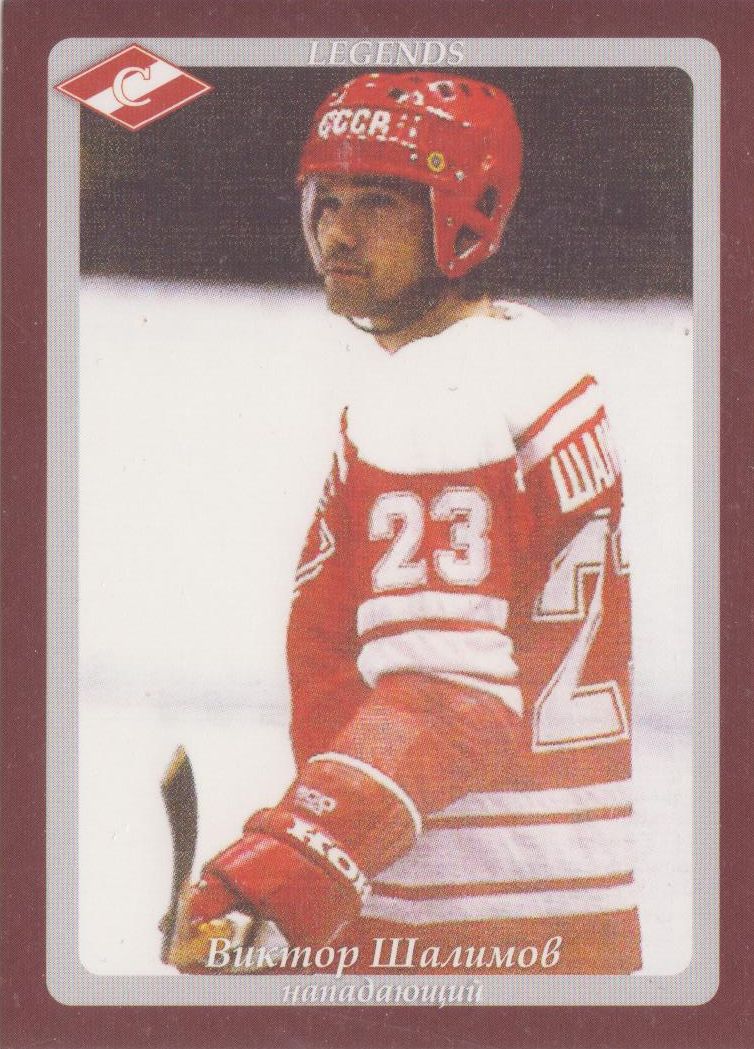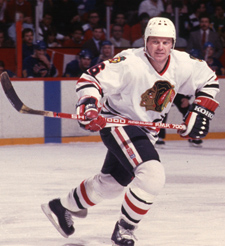seventieslord
Student Of The Game
Viktor Shalimov, RW

- 5'10", 176 lbs
DOMESTIC
- USSR League Champion (1976)
- USSR 1st All-Star Team (1976, 1982)
- Placed top-10 in scoring 7 times (1st, 3rd, 5th, 6th, 6th, 7th, 7th)
- Placed top-15 in MVP voting 5 times (3rd, 4th, 7th, 9th, 15th)
- Converted USSR VsX scores: 89, 77, 76, 73, 68, 63, 60
INTERNATIONAL
- World Championship/Olympic Gold (1975, 1976, 1981, 1982)
- World Championship Silver/Bronze (1976, 1977)
- Top-2 in scoring in major tournament three times (1st-1975, 1st-1976, 2nd-1982)
- 61 points in 49 major international games
- Also 19 points in 18 Summit/Canada Cup/Super Series Games
- Led all Soviets with 8 points in 1975 Super Series
- His two goals in his only 1974 Summit series game were the 2-1 (unassisted) and 3-1 (shorthanded) goals in the 4rd period of the final game, won 3-2 by USSR
- 3rd in Golden Stick voting (1982)
- Best forward award (1982)
How Shalimov scored his two goals in game 8 of the 1974 summit:

- 5'10", 176 lbs
DOMESTIC
- USSR League Champion (1976)
- USSR 1st All-Star Team (1976, 1982)
- Placed top-10 in scoring 7 times (1st, 3rd, 5th, 6th, 6th, 7th, 7th)
- Placed top-15 in MVP voting 5 times (3rd, 4th, 7th, 9th, 15th)
- Converted USSR VsX scores: 89, 77, 76, 73, 68, 63, 60
INTERNATIONAL
- World Championship/Olympic Gold (1975, 1976, 1981, 1982)
- World Championship Silver/Bronze (1976, 1977)
- Top-2 in scoring in major tournament three times (1st-1975, 1st-1976, 2nd-1982)
- 61 points in 49 major international games
- Also 19 points in 18 Summit/Canada Cup/Super Series Games
- Led all Soviets with 8 points in 1975 Super Series
- His two goals in his only 1974 Summit series game were the 2-1 (unassisted) and 3-1 (shorthanded) goals in the 4rd period of the final game, won 3-2 by USSR
- 3rd in Golden Stick voting (1982)
- Best forward award (1982)
Kings Of the Ice said:It was the winter of 1975-76 that hockey teams from the USSR first played a series of games against NHL teams in North America. After one of the goals scored by the Soviet Wings in the last game against the Islanders, all the players on the soviet bench burst out laughing. It was scored by Viktor Shalimov, and the goal actually was kind of funny. "We were doing our best to defend our net because we were one man short. One of our players lobbed the puck into the Islanders' zone. I rushed into their zone just in case, although I realized that the American goalie would be the first to reach the puck. And then the goalie's stick split in half. Shadrin yells to me, 'Shoot!' A defenseman took the goalie's position in the net. Then I zipped behind the net, and the defenseman followed me. I managed to sweep around the net, but he didn't, and by that time the puck had already crossed the goal line..."
In that series, Shalimov scored a goal in every game... Shalimov chalked up the greatest number of points among the soviet players... whenever Shalimov played in games at the highest level, he almost always played well or even brilliantly. But he sometimes missed out on the most crucial games. In the 174 series against the best of the WHA, the coach of the soviet team Boris Kulagin, kept him in reserve for seven games and let him out on the ice only in the last game. And Shalimov scored two goals. The following spring, at age 24, Shalimov made his debut in the world championships, and right off the bat, he racked up the highest number of points.
In 1976 Spartak won the championship. It appeared that Shalimov had a long and productive career ahead of him. But Spartak was a capricious and uneven team. Coaches came and went. Shalimov was matched up with faster partners and earmarked as the playmaker. Not only that, he was often given the job of neutralizing the leading players of the strongest opposing teams. Shalimov, who had joined the world of hockey to score goals, win victories, and experience thrills, was starting to get bored. He spent time wasting away in secondary roles until he was placed on Spartak's main forward line together with Shadrin and Yakushev. At that time, the line thrived on Yakushev's scoring talents. his partners merely fed passes to him. But with the arrival of Shalimov, the forward line experienced rejuvenation. Things started to click. The scoring ability of all three players evened out and Yakushev got his second wnd. Their game began to really sparkle.
Shalimov was always thought of as an optimist, and he glowed when everything was running smoothly for the team. When a game was well-played, he couldn't contain his enthusiasm and had to share it with others. But in the second half of the 1970s, he began to wilt. He went through a long time drought during which the coaches of the national team seemed to have forgotten his name. Having slept through some of the best years of his hockey life, he tuned back into the game in 1980 on the eve of his 30th birthday. Boris Kulagin shook up the lines in an attempt to bring the team out of its slump. The virtually unknown Sergei Shepelev and Sergei Kapustin were paired off with Shalimov, and once again an excellent forward line began to produce results on the ice. More than anyone else, Shalimov was thrilled with the realignment. He got a chance to relive the glory days of the mid-1970s. He once again gave his game everything he had, stickhandling his way around the ice at top speed in the best tradition of soviet hockey.
The Shepelev line outperformed the others during the 1981 world championship... they put up an incredible performance in the most important games - the semifinal against Czechoslovakia and the final against Canada - Shalimov and Shepelev cooked up some real magic, dazzling the spectators with their feints and lightning passes. In tough contests on rinks narrower than Shalimov was accustomed to, he proved that he didn't have to have free, open spaces for his style of play to work. he was in such good shape that, against all resistance, he was able to create his own free ice.
The magic lasted through one more world championship. Shalimov was older than his partners and called it quits before the others. In spite of his quiet years, he was a truly remarkable hockey player. He had a refined feel for the game and displayed a high degree of coordination, maneuverability and self-composure. He was almost an ideal hockey player, but right to the end he never felt he was the master of his own fate.
Hockey (1985 Soviet hockey book) said:Says Viktor Shalimov, olympic champion of 1976, the merited master of sports: "A player who is regarded as a sports personality is above all fanatic of hockey, fanatic in the sense of faithful devotion to this game. Sports does not isolate players from the rest of the world but it does not forgive betrayal. You should never get on the ice just "to play your number". Any match with any opponent is a test. There is no way of playing below your level. Being a sports personality means playing with self-denial fully absorbed in the game without fear of injuries. This is sport. The manly sport."
passionhockey.com (rough translation) said:For two years , they as right winger Viktor Shalimov , who knows how to use spaces to reveal its qualities of great goalscorer .
chidlovski.com said:Yakushev was nicknamed as the "Big Yak" and was the top offensive talent of the line. Shadrin was a brilliant two-way forward. After the 1974 Summit, Shalimov completed the line with a free-wheeling high-scoring right wing.
How Shalimov scored his two goals in game 8 of the 1974 summit:
The Forgotten Summit said:Victor Kuznetsov fired a rocket on the net that Cheevers stopped, but he lost control of the rebound. Neither Stapleton nor Tremblay could clear it, and it went to Viktor Shalimov to the right of Cheevers. He easily flipped the puck into the net, putting the Soviets into the lead for the first time in the game.
...Canada could not capitalize on this advantage, as the soviet penalty killing was superb. It was the soviets who broke through here, as Yakushev and Shalimov took a two-on-one with J.C. Tremblay back. They passed the puck back and forth with mind-boggling speed. They finished the play with Shalimov taking a perfect goalmouth feed from Yakushev and snapping the puck past Cheevers for his second goal of the game.
Last edited:

















